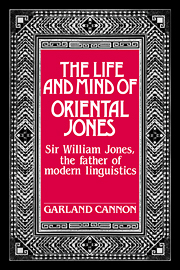Book contents
- Frontmatter
- Contents
- Preface
- Introduction
- Chronology of Jones's Life
- 1 A Barbaric Oriental Conqueror (to 1770)
- 2 Delicate Arab Maidens and Liquid Ruby (1770–1772)
- 3 Persian Jones and Constitutional Law (1772–1777)
- 4 The Athenian and Eleutherion (1778–1780)
- 5 An Ass Laden with Gold (1780)
- 6 Politics: Writings and Activism (1780–1782)
- 7 James River Property (1782–1783)
- 8 A Vision in the Indian Ocean (1783–1785)
- 9 A Sacred Oriental Language (1785)
- 10 A Genetic Explanation: Indo-European (1786–1787)
- 11 Sanskrit Literary Treasures (1787–1788)
- 12 An Indian Renaissance (1789)
- 13 A Burning Tropical Sun (1790–1791)
- 14 Scholar-Martyr (1791–1794)
- 15 Jones Today
- Appendix Five New Letters by Jones
- Notes
- Selected Bibliography
- Index
5 - An Ass Laden with Gold (1780)
Published online by Cambridge University Press: 11 September 2009
- Frontmatter
- Contents
- Preface
- Introduction
- Chronology of Jones's Life
- 1 A Barbaric Oriental Conqueror (to 1770)
- 2 Delicate Arab Maidens and Liquid Ruby (1770–1772)
- 3 Persian Jones and Constitutional Law (1772–1777)
- 4 The Athenian and Eleutherion (1778–1780)
- 5 An Ass Laden with Gold (1780)
- 6 Politics: Writings and Activism (1780–1782)
- 7 James River Property (1782–1783)
- 8 A Vision in the Indian Ocean (1783–1785)
- 9 A Sacred Oriental Language (1785)
- 10 A Genetic Explanation: Indo-European (1786–1787)
- 11 Sanskrit Literary Treasures (1787–1788)
- 12 An Indian Renaissance (1789)
- 13 A Burning Tropical Sun (1790–1791)
- 14 Scholar-Martyr (1791–1794)
- 15 Jones Today
- Appendix Five New Letters by Jones
- Notes
- Selected Bibliography
- Index
Summary
Moved by his feelings about the war, Jones had questioned the British policy from the outset, and he had become more sympathetic toward the American cause as the conflict lengthened and the British situation became more hopeless. America required de facto independence – at least a family compact. Jones's classical background now persuaded him to use his literary talents to influence others toward his view.
He became a poet and pamphleteer within the heroic milieu of the American Revolution. Contributing to the rising stream of radical publications amid his efforts for the judgeship and a burgess's seat from Oxford, Jones wrote three poems and six prose works between 1780 and 1783 that associated him with the radical Whigs. The first was Ad Libertatem, composed about December 1779. Some stanzas are little more than a liberal translation of William Collins's “Ode to Liberty.” This animated Alcaic expresses Jones's views about the war, with poetic amplification and coloring. Not really seeking to conceal his authorship, he signed the 172-line ode as Julius Melesigonus, an anagram of Gulielmus Jonesius, and had John Nichols print copies for friends. When surprising news arrived, he had a limited reprinting on 27 April, with copies going to acquaintances sharing his views.
One copy went to William Adams, Johnson's friend and the master of Pembroke.
- Type
- Chapter
- Information
- The Life and Mind of Oriental JonesSir William Jones, the Father of Modern Linguistics, pp. 114 - 140Publisher: Cambridge University PressPrint publication year: 1991

